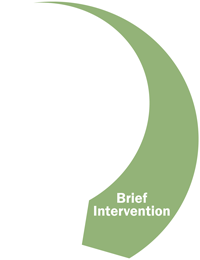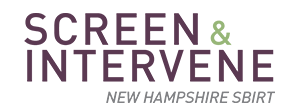Youth Brief Intervention
 The term brief intervention, in the context of SBIRT, encompasses a combination of approaches, including:
The term brief intervention, in the context of SBIRT, encompasses a combination of approaches, including:
- Positive Reinforcement
When a patient or client’s screening results are negative for use, positive reinforcement is a crucial opportunity to reinforce health affirming behavior. It can be as simple as saying “I see that you report not using any alcohol or other drugs. Most people your age do not and I’m really glad to see you are making this choice for your health and safety.” This is a unique prevention opportunity and is a key benefit of the SBIRT approach. - Brief Advice
When a person screens positive, a conversation with their healthcare provider is the next step. When the screen is positive but the use is infrequent and there is no substance use disorder diagnosis, brief advice is warranted. This very quick follow up acknowledges the positive screen, and for youth or pregnancy women advises against further use and provides information. - Brief Intervention
When the screening and further assessment indicate a substance use disorder, a brief intervention is indicated. A brief intervention in the practice setting is a conversation using simple motivational interviewing techniques to understand the role substance use is playing in that person’s life and to explore the degree to which a person is willing to make a voluntary change to reduce use. The goal of the conversation is to increase the person’s awareness of problematic substance use and encourages changes in behavior. Screening results are usually scored as low, moderate, or harmful. Depending on the person’s results, it might be necessary to make a referral to a behavioral health specialist for an assessment to determine the best level of care. The brief intervention conversation is required to engage the patient in the decision to participate in specialty care and to facilitate a successful referral to treatment. - Brief Treatment
Brief treatment and brief intervention are terms that are often used interchangeably. However, brief treatment typically involves several scheduled follow up visits with a behavioral health practitioner. The goal is either intervention in problematic use or mild/moderate substance use disorders; or increasing motivation to access specialty care for those with severe substance use disorders. There are manualized protocols for brief intervention that do not require behavioral health clinicians, these are not however, the brief intervention conversations references above but are individual counseling sessions.
Youth Brief Intervention Example
The following video is an example of a brief intervention with an adolescent. The video was produced by SBIRT Oregon:
In the video above, the pediatrician encompasses several strategies to conduct a successful brief intervention:
- Build Rapport
- “Do you have any questions for me?”
- “That’s great, I’m really proud of you for talking about this.”
- Pros/Cons of Use
- “I’m curious, what do you like about drinking alcohol? –> “So it sounds like you feel relaxed and you have fun when you’re drinking with friends, and you like the taste….”
- “I’m also curious if there is anything you don’t like about drinking alcohol?” –> “So more negative things about your drinking, like getting into trouble with your mom or being late for class at school because of your hangover….”
- Feedback
- “As your doctor, I want you to know that I’m concerned about your drinking.”
- “When teens drink – things can go wrong, like injuring yourself….”
- Readiness to Change
- “What some people your age do is stopping drinking for some time to see what it feels like.”
- “Do you think you could try not drinking for two months?”
- Prescription for Change
- “What things would make it easier for you to not drink?”
- “Is there anybody in your life who could support you in not drinking?”
More examples for strategies and language commonly used in brief interventions can be found in the Brief Negotiated Interview and Active Referral to Treatment Provider Training Algorithm from the BNI-ART, Boston University School of Public Health. While understanding common terminology is critical, provider training in brief interventions and motivational interviewing are key components to success.
